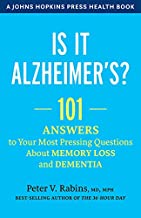Alzheimer’s Disease
A progressive disease that destroys memory and other important mental functions.
Brain cell connections and the cells themselves degenerate and die, eventually destroying memory and other important mental functions.
Memory loss and confusion are the main symptoms.
No cure exists, but medications and management strategies may temporarily improve symptoms.
Cluster Number:
Wiki Number: W007
Diagnosis: Alzheimer’s Disease
US Patients:
World Patients: 30Mil
Sex Ratio: M; 3F
Age Onset: 65+to42% by 80+
Brain Area: hippocampus, amyloids & tau proteins, 19 genes
Symptoms: forgetting, poor short term memory, location confusion
Progression: poor thinking, repetitious conversations, abusive, anxious, paranoid, loses ability to live
Causes: 19 genes, head injuries, depression, hypertension, smoking
Medications: memantine, acetylcholinemesterase inhibitors
Therapies: Chess, book-reading, exercise;low-fat diet, caffeine, wine
Youtube Video: Alzheimer’s Disease-Early Signs
Amazon or Library Book:
Is It Alzheimer’s?
Amazon or Library Book:
36-Hour Day
Click the book to link or order from Amazon.
Click the book to link or order from Amazon.


